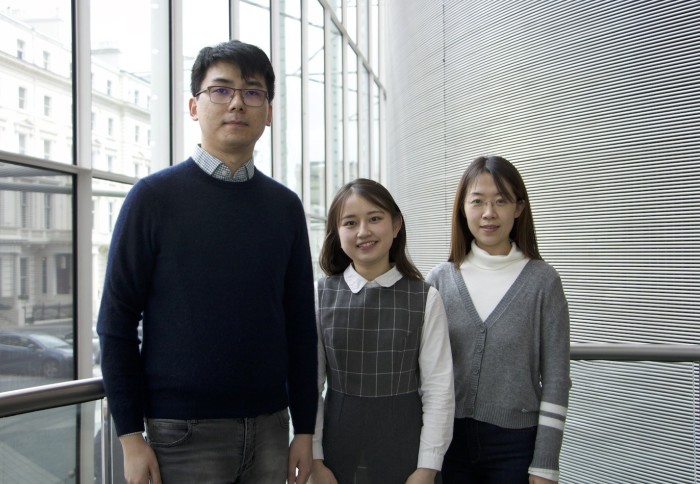Microplastic solution wins Imperial's top prize for women entrepreneurs

A student-founded startup from Imperial has developed an algae-based alternative to harmful microplastics.
Green Beads, founded by Lu Ai from the Department of Chemical Engineering, won the £15,000 top prize in the WE Innovate final on 28 October for developing a sustainable product that could replace harmful microplastics often found in toiletries, paint and detergent.
WE Innovate is a women’s entrepreneurship programme run by Imperial Enterprise Lab designed to inspire and accelerate the progress of women entrepreneurs. At the final, held virtually for the first time, five finalists battled it out in the hope of winning a share of a £30,000 prize pot, sponsored by bp.

Biodegradable algae
Microplastics are tiny pieces of plastic smaller than 5mm that pass through water filtration systems, entering the ocean and contaminating the ecosystem, posing health risks to humans and wildlife. They are found in many household products, such as microbeads in toiletries and detergents.
Green Beads aim to provide an alternative to microplastics with biodegradable, non-toxic algae, which they would harvest and shape into beads.

The team behind the startup say that their beads could be added into paints for sustainable painting, or to extend the shelf life of cosmetic products by incorporating antimicrobial agents into the beads. Algae which grows naturally in water, so the team say they would not need to use arable land to produce it, further boosting the product’s sustainability.
The WE Innovate final was judged by a panel of experts from entrepreneurship, academia and industry, including Stefano Ciampolini, Managing Partner at Heathcare Capital Partners, Kate Bingham, Managing Partner at SV Health Managers LLP and Chair of the UK Vaccine Taskforce and Aleida Rios, Senior Vice President of Engineering at bp.
Pioneering women
Several additional prizes were awarded during the final. WeAlign, founded by Innovation Design Engineering student WuQing Hipsh, were awarded second prize, taking home £10,000. Their online platform aims to increase accessibility and adherence to rehabilitation for people with balance disorders to help them regain confidence, improve mobility and reduce the risk of falls.
Third prize of £5,000 went to R-SPYRA for developing SpiroLyte, a pocket-sized, collapsible spacer for inhalers used by children with asthma. Asthma spacers are tube-like devices that attach to inhalers, slowing down airflow to optimise drug delivery to the lungs.
The audience was also asked to vote for a semi-finalist team to win the Lauren Dennis Award, comprising of a tailored mentoring package to accelerate their ideas beyond the programme. The prize is named in memory of former WE Innovate participant Lauren Dennis, who passed away in 2018.
Two prizes, funded by the Engineers in Business Fellowship, were awarded to semi-finalist teams from engineering backgrounds. Winning a share of £3,000 are WeAlign and CalidiScope, a mattress topper with embedded sensors prevent pressure ulcers in patients.
“Significant contributions to society”
Professor Maggie Dallman, Vice President (International) said: “I have been proud to champion women’s participation in STEM (Science, Technology, Engineering, and Medicine), both as researchers and entrepreneurs. Supporting female students not only enables them to realise their personal potential but empowers them to make significant contributions to society.
“Since its launch in 2014, WE Innovate has helped over 300 women on their entrepreneurial journey and it has been a pleasure to watch the programme grow. This year the programme has expanded from its original 3-month format to one which runs from January to October, and has seen the addition of WE Alum Peer Mentors – graduates of the programme who kindly volunteer their time to provide one-to-one support for this year’s cohort.”
"Diverse generation of entrepreneurs"
Aleida Rios, Senior Vice President of Engineering at bp added: "This is a fantastic initiative which is helping launch the next diverse generation of entrepreneurs. Women bring valuable diversity of thought, experience and perspective. We are creative and innovative which is needed to solve the world’s most complex problems, and help improve people’s lives and our planet.
"It’s so great to see technology concepts develop into viable start-ups that are really making a difference. These activities reflect bp’s ambition – to become a net zero company by 2050 or sooner, and to help the world get to net zero – so we’re extremely happy and excited to give our support."
WE Inspire
As part of this year’s programme the Enterprise Lab also hosted the WE Inspire Conference, a series of inspirational talks from women entrepreneurs about their personal journeys and leadership. Attendees had the chance to hear from Zainab Ahmed, Imperial graduate and co-founder of QuickCount, a point-of-care blood analysis tool to help doctors diagnose whether a patient has a bacterial or viral infection, as well as network with this year’s WE Innovate cohort.
Article text (excluding photos or graphics) © Imperial College London.
Photos and graphics subject to third party copyright used with permission or © Imperial College London.
Reporter
Joanna Wilson
Communications Division